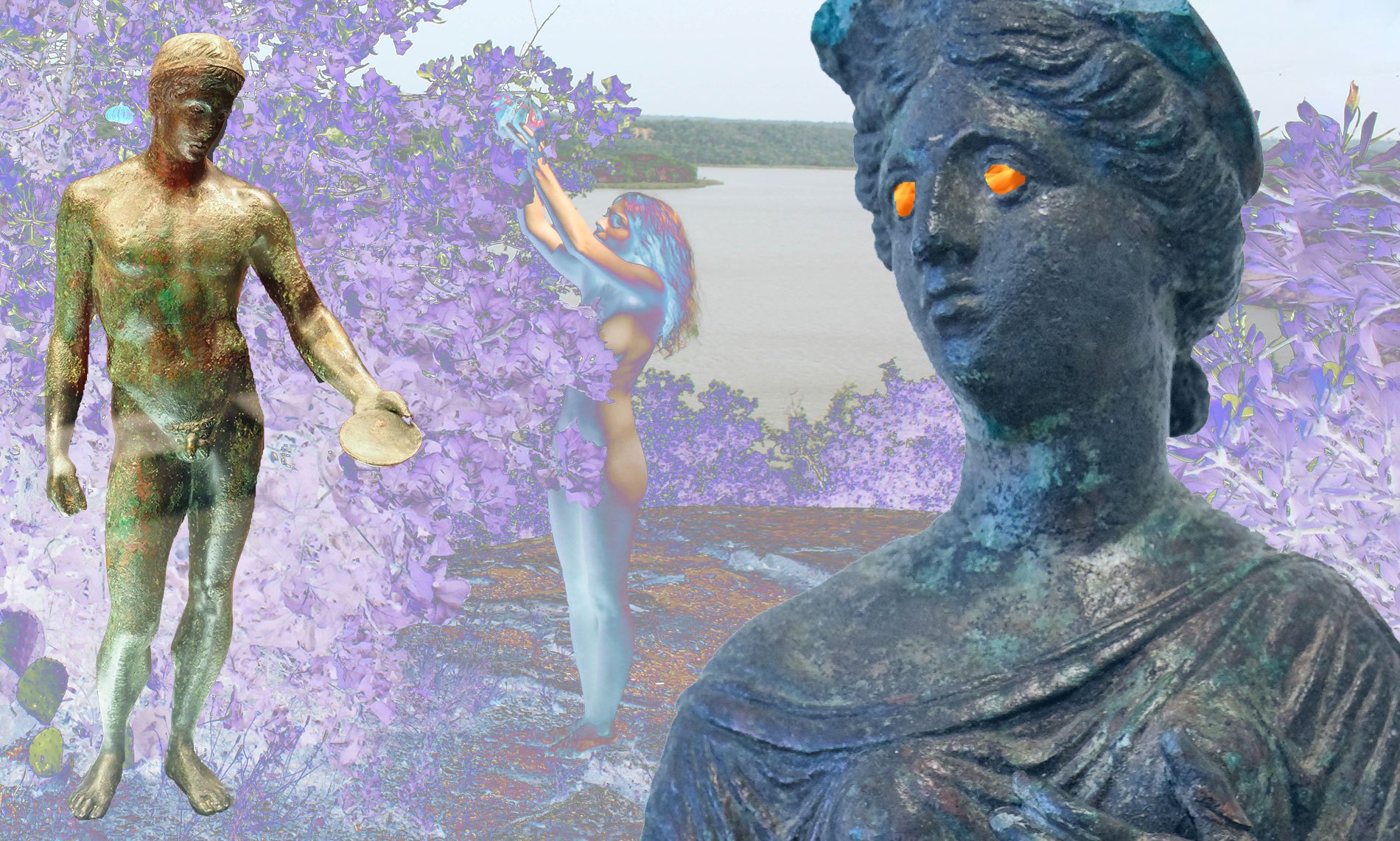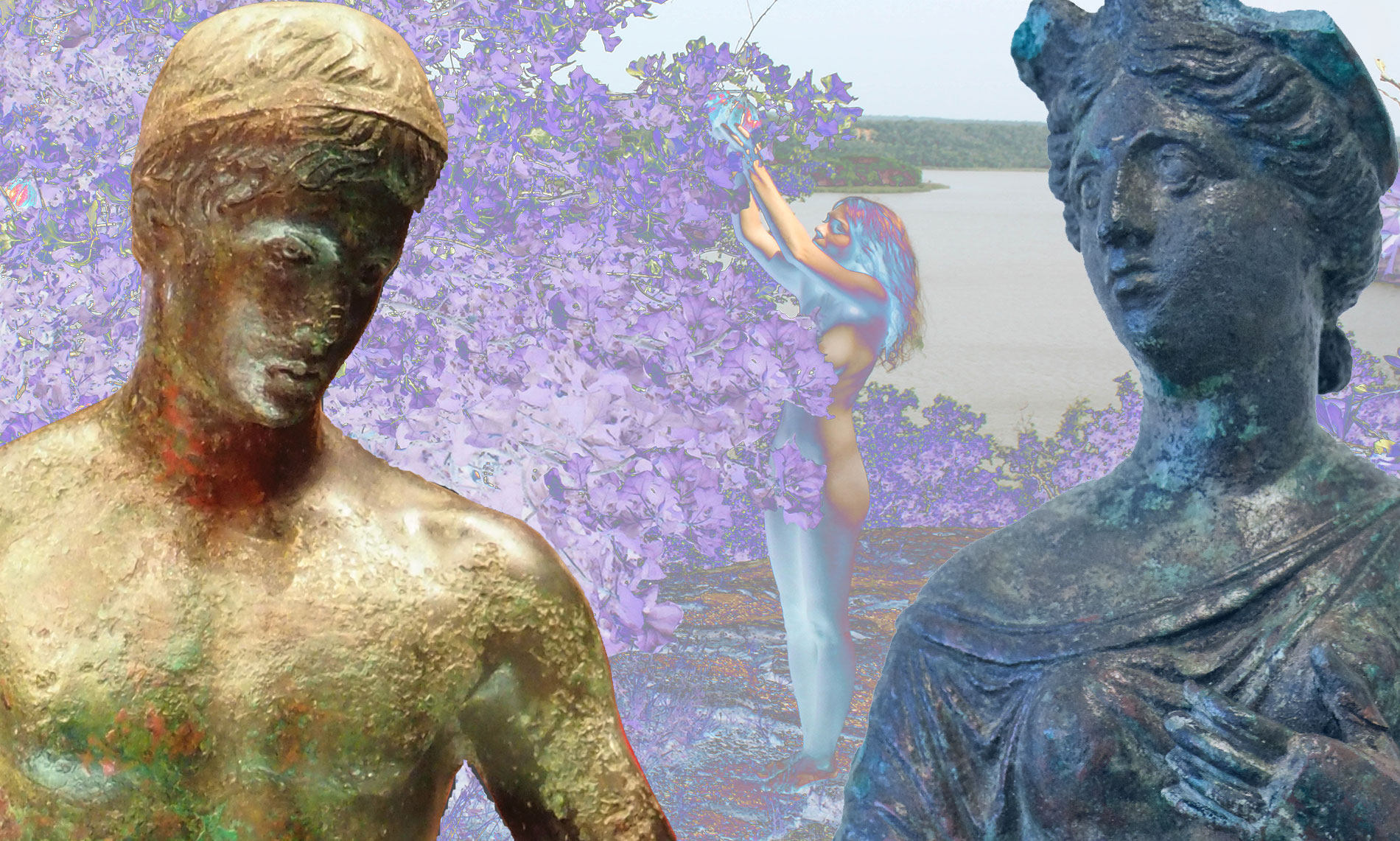
I, Isis, daughter of the Goddess, child of the stars, I followed you in this magic garden. I’m looking for you, O my Idriss, I want you close to me. Closer, my love, my life. Take me. I’m shaking too. I give you my person. May the virgin be a woman in your arms.
All through the night they have sailed together, sailing sometimes on beautiful seas, sometimes in the hollow of the waves. The wind of passion has rolled them from one side to the other. The storm delighted their soaked bodies. They struggled. They intertwined, crumpled, broken, caressed on the crest of the bottom blades that projected them to the sky. Broken in their outburst by a rascal wave, they took themselves as one takes to the sea. They touched down well before dawn. Isis was his wife, Idriss was her man, both were happy as few can be. High consecration, delicious offertory, sublime eucharist.
– Aphrodisiac incense is born. Our pagan virgin does exist, whispers Idriss in his enjoyment.
– What are you saying ? exclaimed the young woman. Isis has not lost any memories of Hera Hathor. How could she forget this piece? It is one of the great tunes of the Opera of Alcor, written and composed by Idriss at the time when he was still in the body of Enoch. Would he finally find his memory?
– This piece, where do you know it? Who taught you, Idriss? Answer, it’s important.
– What have you suddenly my beloved? Here you are different. Where is the tender Isis I cuddled on the beach and who eats kisses in the storm?
Isis bites her lip. She knows she must not hit him head-on. He is not ready yet. Enoch’s coat is too wide for his young shoulders. Idriss does not care to find his memory, yet it returns to his face. Isis must be quiet. She must love him. The little males are sometimes so frail, so fragile! A breath bends them. Any little thing makes them shady. The Goddess does not want to spoil the beauty of his return to life. To desire.
“Isis, I killed a man,” the young man whispers. I think I wake up from a nightmare, but no, that’s true. I killed a man by my hand.
– Yes, Idriss.
– He was a sage. His name was Rama.
– Yes, Idriss.
– I did not want to. I loved him! He did not want to live anymore, so he gave me a trap. By my hand, he killed himself!
– Yes, Idriss.
Around them, the garden has changed. It takes its dazzling adornment, various birds chirp in the hackberries. Large draperies of vines of multicolored orchids have descended from the foliage. Around the blooming chalices fly flocks of hummingbirds. A heron walks with a mechanical step on the margin of a blue pond. Further, noisy and soft, arises a flight of flamingos. It seems like life has just hatched. Everything is so calm, serene.
Idriss took a thrill. If he could stop the invariable course of time, how gladly he would return to the moment Rama handed him the mortal sword. With what joy he would refuse! To be able still to hold in his arms the one who was a man yesterday, and who is no more than a body. How can one lose one’s life when life is everywhere around us? Why must one day stop, as if it had never started? Idriss cries. He does not feel the tears wet his beardless cheeks. He does not feel the finger of his beloved one who draws the contour of his lips, and who, one by one, dries his tears.
Time is a snake that wraps around my arm. Like a spring my arm relaxes. Time is a sword that flies toward its prey. In a deafening silence, the weapon strikes. Time strikes me and scatters me. We were innocence, carefree youth, love held us good, and here it flickers like the flame of a candle in the wind. Where does this fear of losing you come from, O my love, my beloved, my dove, my peace? I played, I lost. Here I am parricide. Rama was so good, how can he die? I was a son for him.
He wanted to give me … What exactly? What has he left me but remorse without bottom, without limit, without light? I die, the dead man seizes the snitch, here is the old Lama pulling me by the feet. Protect your lover, hear his prayer. Put him in your nest, sweet Goddess he loves more than life. On this beautiful day of your return, you made love, yet his heart is heavy. Do you feel it? the blood on his hands is not yours. Do you see him? Too much blood! Too many deaths … All those bodies that are suffering, do you see them? So many lives stolen, so many fleeting moments, wounds that will never be closed.
But you, my Isis. When I knew you, you were my mother. When we loved first, you were the Goddess that everyone respects. The great Hathor gave me her divine body – to me, poor Enoch. She gave herself to me, I loved her like an endless day. Eternity was our couch, adultery was our bed. I picked words on your mouth that none of your sons has heard. You gave me more than wings: a brand new body. Then I was the widower and the orphan, now I am the ox of the sacrifice. May time stop my hand! May the fate be propitious at long last!
The Goddess does not answer a word. Tender, she lets her fingers run on his man’s torso. Violently happy she feels. The one she has loved for so long, now she has found. For him, the Goddess has violated so many regulations. She has unduly prolonged her lover’s days. She has provided him with another body, he who is only an ephemeral. By her fault, a mortal might not die, when so many gods will never have this advantage. Death strikes at all ages, all ranks. Do you know the day, do you know the time? My beautiful love, let us love, let us make our love draws the future and the pare of sumptuous finery. Everyone wishes, each in turn. What’s yours, Idriss? I am the fairy Isis, I can do everything. I can bring everything up.

Idriss keeps silent. So he knew his mother, so he killed his father, now he does not care. Fortunately, unfortunately, what is done remains ever. Crying is useless. Mourning means less. He lowers his eyes and sees his hand rested on a breast of his wife. He wants to relive in her, to think no more about anything. He’s feeling good. All despair is vain.
– Let us love, my siren.


